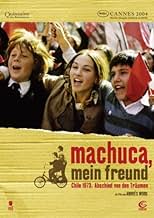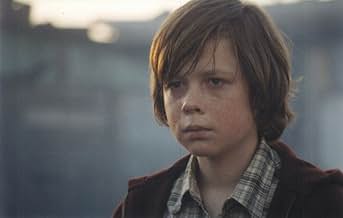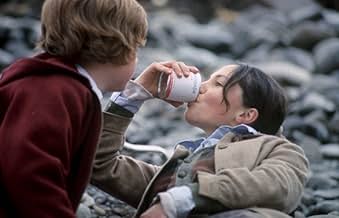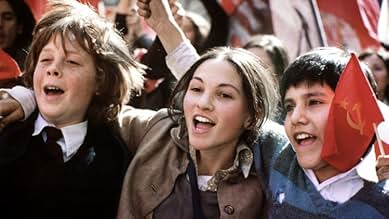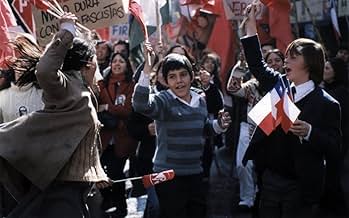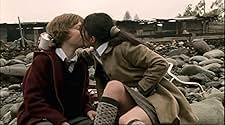CALIFICACIÓN DE IMDb
7.7/10
13 k
TU CALIFICACIÓN
Dos niños chilenos de 12 años de diferentes clases sociales se hacen amigos en 1973. Ambos descubrirán poco a poco el mundo del otro al tiempo que aumentan las tensiones políticas del país.Dos niños chilenos de 12 años de diferentes clases sociales se hacen amigos en 1973. Ambos descubrirán poco a poco el mundo del otro al tiempo que aumentan las tensiones políticas del país.Dos niños chilenos de 12 años de diferentes clases sociales se hacen amigos en 1973. Ambos descubrirán poco a poco el mundo del otro al tiempo que aumentan las tensiones políticas del país.
- Dirección
- Guionistas
- Elenco
- Premios
- 13 premios ganados y 8 nominaciones en total
Aline Küppenheim
- María Luisa Infante
- (as Aline Kuppenheim)
Daniel Alcaíno
- Sargento Ejército
- (as Daniel Alcaino)
Opiniones destacadas
In 1973, the Chilean military, under the direction of General Augusto Pinochet and backed by the CIA, overthrew the shaky socialist government of democratically elected President Salvador Allende. The coup led to the murder of 3,000 leftist Allende supporters and the detention of an estimated 250,000 political prisoners. Set against the background of the political instability that led to the crisis, Andrés Woods' Machuca is the moving story of the friendship between two boys from different sides of the social spectrum. Voted the most popular film at the 2004 Vancouver Film Festival and a major box-office hit in Chile, the semi-autobiographical film succeeds on both a human and a political level, the different elements coming together in a final conflagration.
Gonzalo Infante (Matias Quer) is a chubby, red-faced 11-year old who attends St. Patrick's private school. He lives in a wealthy neighborhood where his security is unquestioned, even though he knows that his mother Maria (Aline Kuppenheim) is having a long-standing affair with a well-to-do Argentine businessman. Gonzalo is shy and inexpressive and is often bullied at school. His life changes, however, when Father McEnroe (Ernesto Malbran), the priest who runs the school, opens St. Patrick's to those who are unable to pay, and Gonzalo develops a friendship with Pedro Machuca (Ariel Mataluna), a youngster who lives in a nearby shantytown. The inclusion of the marginal students causes unrest at the school. Fights break out between the two economic classes and parents hastily call meetings to voice their opposition to the "communist" priest. Gonzalo protects Pedro from the bullies and later visits Pedro in his home.
Aware of how much he has, Gonzalo accepts his status without feeling superior, though Pedro's family refers to him as "the snob". In a subplot, Pedro's seductive young cousin Silvana (Manuela Martelli) gives both boys an introduction to sexual pleasure. Though the relationship between the two boys develops naturally and their innocence allows them to see past the developing turmoil, the disturbing layers of adult events slowly begin to threaten their friendship. To pick up some extra money, the boys attend political rallies and sell Chilean flags to both the Nationalists and the Communists, but soon emotions escalate and street fights break out between far-left and far-right militants. The onset of revolt is signaled by the arrival of two jets flying towards the Presidential Palace, a seminal event in Chile's history that marked the end of their democracy.
One of Chile's most successful young filmmakers, Woods lets the facts speak for themselves, and Machuca makes its points with an emotional power unencumbered by bias or simplistic messages. While the upper middle class is shown as elitist and disdainful of the working class, Pedro's family is also not portrayed in glowing terms. In a drunken rage of victimization, the father tells his son that in a few years, "He (Gonzalo) will be working for Daddy....You'll be cleaning toilets." The children are portrayed as simply children without the false glow of larger-than-life heroism. Although Machuca may ultimately have more of an impact for Chileans who experienced the coup directly, its theme of young people caught in the swirl of events beyond their understanding resonates far beyond the details of this single tragic moment in history.
Gonzalo Infante (Matias Quer) is a chubby, red-faced 11-year old who attends St. Patrick's private school. He lives in a wealthy neighborhood where his security is unquestioned, even though he knows that his mother Maria (Aline Kuppenheim) is having a long-standing affair with a well-to-do Argentine businessman. Gonzalo is shy and inexpressive and is often bullied at school. His life changes, however, when Father McEnroe (Ernesto Malbran), the priest who runs the school, opens St. Patrick's to those who are unable to pay, and Gonzalo develops a friendship with Pedro Machuca (Ariel Mataluna), a youngster who lives in a nearby shantytown. The inclusion of the marginal students causes unrest at the school. Fights break out between the two economic classes and parents hastily call meetings to voice their opposition to the "communist" priest. Gonzalo protects Pedro from the bullies and later visits Pedro in his home.
Aware of how much he has, Gonzalo accepts his status without feeling superior, though Pedro's family refers to him as "the snob". In a subplot, Pedro's seductive young cousin Silvana (Manuela Martelli) gives both boys an introduction to sexual pleasure. Though the relationship between the two boys develops naturally and their innocence allows them to see past the developing turmoil, the disturbing layers of adult events slowly begin to threaten their friendship. To pick up some extra money, the boys attend political rallies and sell Chilean flags to both the Nationalists and the Communists, but soon emotions escalate and street fights break out between far-left and far-right militants. The onset of revolt is signaled by the arrival of two jets flying towards the Presidential Palace, a seminal event in Chile's history that marked the end of their democracy.
One of Chile's most successful young filmmakers, Woods lets the facts speak for themselves, and Machuca makes its points with an emotional power unencumbered by bias or simplistic messages. While the upper middle class is shown as elitist and disdainful of the working class, Pedro's family is also not portrayed in glowing terms. In a drunken rage of victimization, the father tells his son that in a few years, "He (Gonzalo) will be working for Daddy....You'll be cleaning toilets." The children are portrayed as simply children without the false glow of larger-than-life heroism. Although Machuca may ultimately have more of an impact for Chileans who experienced the coup directly, its theme of young people caught in the swirl of events beyond their understanding resonates far beyond the details of this single tragic moment in history.
10dsalvat1
This movie tells a tale on the eve of the darkest hour in Chileann history, where two boys of different social background become friends.
This is a very powerful film, especially for Chileanns and many Latin Americans that suffer the prejudice of classicism (the racism of Latin America) and their ideals being beaten away from them.
You will notice many resentments and insults on this message board as the film gets more exposure due to the fact that some people still live in the past.
I hope this film brings everybody together and shows that no matter what race, religion, sexual orientation or social class, children do not discriminate, everybody feels the same emotions.
Hate is learned by the actions of role models.
This is a very powerful film, especially for Chileanns and many Latin Americans that suffer the prejudice of classicism (the racism of Latin America) and their ideals being beaten away from them.
You will notice many resentments and insults on this message board as the film gets more exposure due to the fact that some people still live in the past.
I hope this film brings everybody together and shows that no matter what race, religion, sexual orientation or social class, children do not discriminate, everybody feels the same emotions.
Hate is learned by the actions of role models.
Although i was not old enough to live through these events, its repercussions are still felt today. Its interesting to see this movie in the theater and hear older people in the audience booing and cheering at the different scenes and historical characters in the movie, meaning that it accurately depicts the events. The movie is excellent in the way it portrays the everyday life experienced back in those days. The movie is apolitical in the way the main characters are children, so the focus is everyday life more than taking an actual view. The great special effects used, increase the realism and makes the movie so much better, and you don't even notice they are being used.
I recommend this movie 100% both to Chileans, and foreigners that want a glimpse on the life of the upper/middle classes in Chile back in 1973.
I recommend this movie 100% both to Chileans, and foreigners that want a glimpse on the life of the upper/middle classes in Chile back in 1973.
I must start with saying that this is probably one of the best movies of the year if not of all times. It s set in the "revolution" days in Chille when the Facists came to power. The story is about a rich boy who studies in a rich school when the principle decides to bring in poor students for free. Of course, the rich kids and their parents doesn't like it but it's not like the poor kids can't stand out for themselves... The rich kid is making friends with a poor kid (Machuca) and they enjoy life together while everything falls apart around them. And there is a very powerful end which I won't reveal, but you'll see it coming if you know history.
The first thing that I've noticed is the cinematography. You know how American movies are always aiming for a perfect clean picture. Well, I don't like that style, and that is why I liked the cinematography in Machuca so much. The picture is a little dark and looks to be old. It gives the movie that is set in the 70's a real 70's feeling. It's very nice, even if the story gets a little boring for a second (nah, the movie was great at every time) the picture still makes it nice to watch.
The second thing that I've noticed is that while the movie is played mainly by kids they actually hold the movie very well. It's a very convincing acting, almost flawless. But the rest of the cast is very good too, the mother, the principle, I enjoyed the acting of all of them. Also to complete a great picture there is a great soundtrack. And when I say great I mean GREAT! The music is so vivid and placed well. It will take a while to get it out of my head. Oh, and another thing. I'm still only learning to appreciate a good editing (it's not a trivial thing at all) but this movie seems to get it all right. Every scene is on place and ends when needed, there are no useless scenes and there is no feeling that something is missing. I think that it's perfect editing (in the sense that they can't edit that movie any better).
So all in all, very very recommended! It's available on DVD for now but it should be released in a month or so in the theaters but it will be a very limited release.
The first thing that I've noticed is the cinematography. You know how American movies are always aiming for a perfect clean picture. Well, I don't like that style, and that is why I liked the cinematography in Machuca so much. The picture is a little dark and looks to be old. It gives the movie that is set in the 70's a real 70's feeling. It's very nice, even if the story gets a little boring for a second (nah, the movie was great at every time) the picture still makes it nice to watch.
The second thing that I've noticed is that while the movie is played mainly by kids they actually hold the movie very well. It's a very convincing acting, almost flawless. But the rest of the cast is very good too, the mother, the principle, I enjoyed the acting of all of them. Also to complete a great picture there is a great soundtrack. And when I say great I mean GREAT! The music is so vivid and placed well. It will take a while to get it out of my head. Oh, and another thing. I'm still only learning to appreciate a good editing (it's not a trivial thing at all) but this movie seems to get it all right. Every scene is on place and ends when needed, there are no useless scenes and there is no feeling that something is missing. I think that it's perfect editing (in the sense that they can't edit that movie any better).
So all in all, very very recommended! It's available on DVD for now but it should be released in a month or so in the theaters but it will be a very limited release.
Our film is shot in Santiago, Chile, and follows two schoolboys shortly before the 1973 military coup. Gonzalo Infante is the son of a wealthy, upper middle class family and goes to a good school. His parents are outraged that children from the poor shanty towns are being introduced to the school and encouraged to mix with their children. Among the shanty town dwellers is the young Pedro Machuca. He and Gonzalo form an increasing bond of friendship as they grow into adolescence. But the gulf between their backgrounds is a powerful one.
The film has been hailed as the most successful Chilean film ever. Made on an apparently tiny budget with help from the UK and Spain, it is anything but small budget in appearance (money from the industrialised European countries goes a long way in Chile!) The story is engaging throughout, and for the Westerner the glimpses into the political history are a window onto a different world.
As there are so many myths surrounding both Allende and Pinochet, I've added a short synopsis that might help as background (and with respect to Chilean scholars I am no expert in the field this sort of information can be gleaned from Amnesty International, recently released USA documents and scholarly sources.
Allende was popularly elected to implement an 'anti-imperialist' program of building socialism within a democratic and constitutional framework in November of 1970. Chile at this time was in the depths of an economic crisis and, like many Latin American countries, had had much of its natural wealth and even ability to manage its own affairs taken by foreign investors, legally and illegally. The lifestyle of the wealthy upper classes contrasted to the poverty of people in the shanty towns, but the educated elite held considerable power. Bent on creating economic chaos, opponents of the new government began deliberately to exacerbate these difficult conditions: the political set off a large exodus of capital, a cessation of private investment, and an extensive withdrawal of bank deposits. nationalizations of American and other foreign-owned companies had sharply increased tensions with the United States, which gave the Nixon administration sufficient excuse to orchestrate an international financial blockade, restricting economic credit to Chile. Simultaneously, C.I.A subsidies were flowing to right-wing media, politicians, and organizations, to assist a campaign of domestic destabilization.
Allende committed suicide in the final stages of the CIA-backed military coup led by Pinochet. The United States had ran covert actions in Chile between 1963 and 1973 leading to the ascension of General Pinochet. The US Government's official report of the operations said it epitomized CIA covert actions (worldwide). However brutal the Pinochet government, it was 'good' for US interests. Thus began 17 years of dictatorship which ended March 11, 1990. According to Amnesty International and the United Nations' Human Rights Committee, 250,000 Chileans had been detained for political reasons by the end of 1973. In 1990, having failed in his bid to gain popular ratification for his rule, Pinochet handed over the presidency to the rightfully- elected Patricio Aylwin Azocar. Chile now has a market economy and the political climate has since remained stable, although there is still considerable tension between the military and the government concerning human rights violations of the Pinochet era. Pinochet still retains a considerable group of supporters, both inside and outside the country and the myths and stereotypes he generated still haunt the political future of Latin America. Some still vividly remember the social anarchy (hyperinflation, expropriation, land invasions and violent confrontations) under the socialist policies of Allende. The more important reason, however, is Chile's economic performance. Without the direct and intentional destabilising influence, and with opponents or poor people simply exterminated, the economy improved. In the weeks that followed the coup, thousands of unionists, socialists, students and left-wing activists were raped, tortured, starved and murdered. extermination of thousands of civilians in South America, but the remaining elite were protected and international relations 'normalised'. As Gonzalo's father says in the film: 'Socialism is good for Chile ... it's just not good for us.'
The film has been hailed as the most successful Chilean film ever. Made on an apparently tiny budget with help from the UK and Spain, it is anything but small budget in appearance (money from the industrialised European countries goes a long way in Chile!) The story is engaging throughout, and for the Westerner the glimpses into the political history are a window onto a different world.
As there are so many myths surrounding both Allende and Pinochet, I've added a short synopsis that might help as background (and with respect to Chilean scholars I am no expert in the field this sort of information can be gleaned from Amnesty International, recently released USA documents and scholarly sources.
Allende was popularly elected to implement an 'anti-imperialist' program of building socialism within a democratic and constitutional framework in November of 1970. Chile at this time was in the depths of an economic crisis and, like many Latin American countries, had had much of its natural wealth and even ability to manage its own affairs taken by foreign investors, legally and illegally. The lifestyle of the wealthy upper classes contrasted to the poverty of people in the shanty towns, but the educated elite held considerable power. Bent on creating economic chaos, opponents of the new government began deliberately to exacerbate these difficult conditions: the political set off a large exodus of capital, a cessation of private investment, and an extensive withdrawal of bank deposits. nationalizations of American and other foreign-owned companies had sharply increased tensions with the United States, which gave the Nixon administration sufficient excuse to orchestrate an international financial blockade, restricting economic credit to Chile. Simultaneously, C.I.A subsidies were flowing to right-wing media, politicians, and organizations, to assist a campaign of domestic destabilization.
Allende committed suicide in the final stages of the CIA-backed military coup led by Pinochet. The United States had ran covert actions in Chile between 1963 and 1973 leading to the ascension of General Pinochet. The US Government's official report of the operations said it epitomized CIA covert actions (worldwide). However brutal the Pinochet government, it was 'good' for US interests. Thus began 17 years of dictatorship which ended March 11, 1990. According to Amnesty International and the United Nations' Human Rights Committee, 250,000 Chileans had been detained for political reasons by the end of 1973. In 1990, having failed in his bid to gain popular ratification for his rule, Pinochet handed over the presidency to the rightfully- elected Patricio Aylwin Azocar. Chile now has a market economy and the political climate has since remained stable, although there is still considerable tension between the military and the government concerning human rights violations of the Pinochet era. Pinochet still retains a considerable group of supporters, both inside and outside the country and the myths and stereotypes he generated still haunt the political future of Latin America. Some still vividly remember the social anarchy (hyperinflation, expropriation, land invasions and violent confrontations) under the socialist policies of Allende. The more important reason, however, is Chile's economic performance. Without the direct and intentional destabilising influence, and with opponents or poor people simply exterminated, the economy improved. In the weeks that followed the coup, thousands of unionists, socialists, students and left-wing activists were raped, tortured, starved and murdered. extermination of thousands of civilians in South America, but the remaining elite were protected and international relations 'normalised'. As Gonzalo's father says in the film: 'Socialism is good for Chile ... it's just not good for us.'
¿Sabías que…?
- TriviaAs stated by the director in several interviews, the movie was shot only on Sundays, due to its small budget.
- ErroresSilvana is standing by the outhouse, then moments later, after camera pans, appears on the other side of Gonzalo.
- Citas
Patricio Infante: Socialism might be better for Chile but not for us.
- Créditos curiososIn the credits at the beginning of the film, the last letter of each word drifts slowly to the right separating from the names
- ConexionesFeatured in Sin maquillaje: Tamara Acosta (2013)
- Bandas sonorasAi Amor
Written and performed by Buddy Richard
Selecciones populares
Inicia sesión para calificar y agrega a la lista de videos para obtener recomendaciones personalizadas
- How long is Machuca?Con tecnología de Alexa
Detalles
- Fecha de lanzamiento
- Países de origen
- Sitio oficial
- Idiomas
- También se conoce como
- Мачука
- Locaciones de filmación
- Productoras
- Ver más créditos de la compañía en IMDbPro
Taquilla
- Presupuesto
- USD 1,500,000 (estimado)
- Total en EE. UU. y Canadá
- USD 26,676
- Fin de semana de estreno en EE. UU. y Canadá
- USD 4,635
- 23 ene 2005
- Total a nivel mundial
- USD 3,187,700
- Tiempo de ejecución1 hora 56 minutos
- Color
- Mezcla de sonido
- Relación de aspecto
- 1.85 : 1
Contribuir a esta página
Sugiere una edición o agrega el contenido que falta


